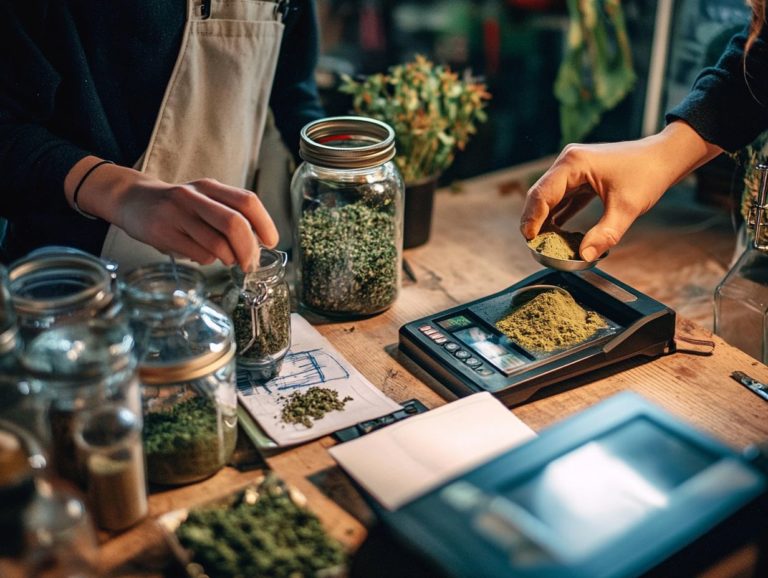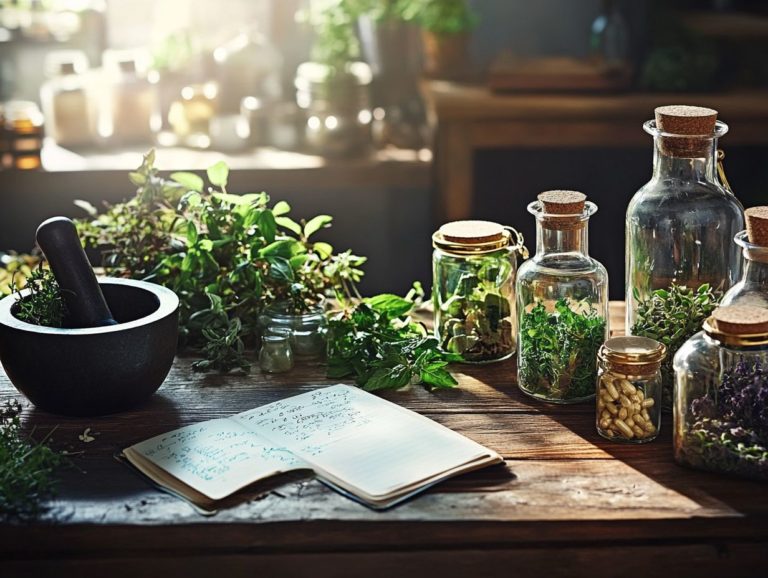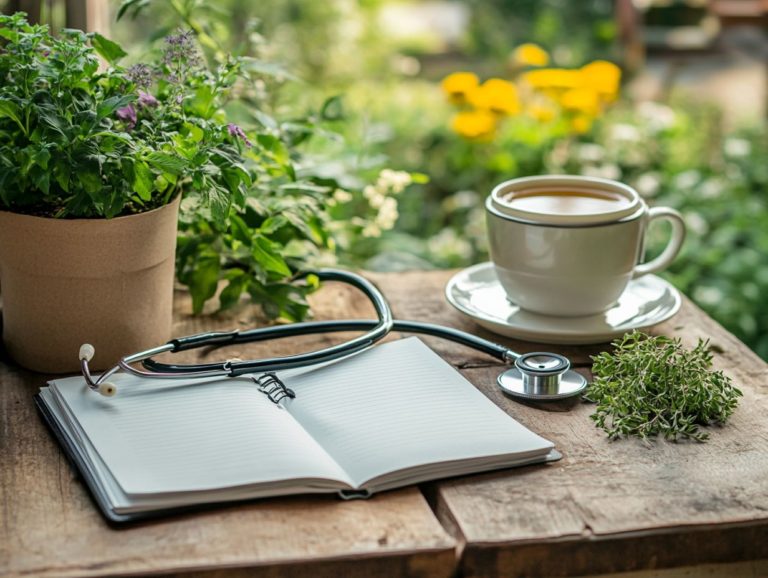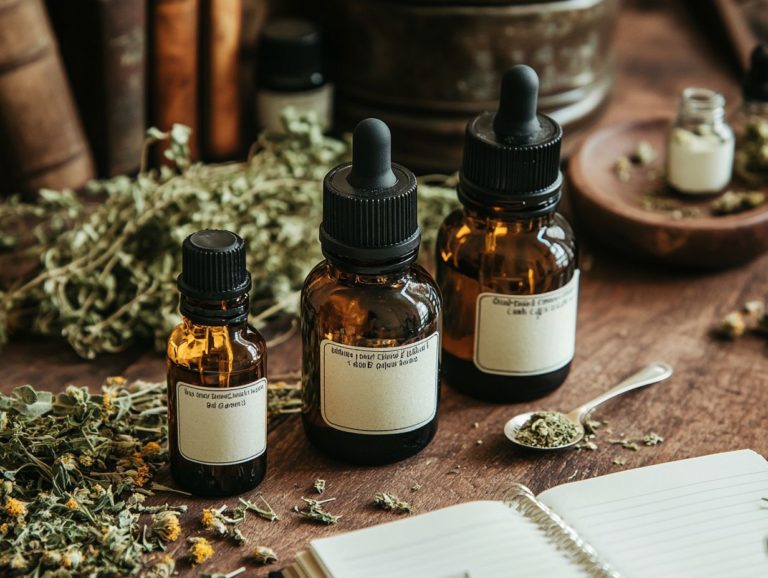Herbal Remedies: Safe Dosage for Adults and Children
Herbal remedies have become increasingly popular as natural alternatives for various health concerns. It’s essential to understand their safe usage, particularly regarding dosage recommendations for herbal medicines.
This guide provides the fundamentals of herbal remedies, emphasizing safety considerations and dosage recommendations for both adults and children. It will also cover best practices for the effective administration of herbal products.
Whether you re considering herbal solutions for yourself or your children, this resource expertly guides you through the world of herbal medicine. It highlights the importance of quality standards and herbal registration.
Contents
- Key Takeaways:
- Safety Considerations for Herbal Remedies
- Dosage Recommendations for Adults
- Dosage Recommendations for Children
- Tips for Safely Administering Herbal Remedies to Children
- Frequently Asked Questions
- What are herbal remedies and why are they popular?
- Is it safe to give herbal remedies to both adults and children?
- How do I determine the safe dosage of herbal remedies for adults?
- What about herbal remedies for children? How do I determine the safe dosage for them?
- Are there any potential risks or side effects when taking herbal remedies?
- Can herbal remedies be used alongside traditional medicines?
Key Takeaways:
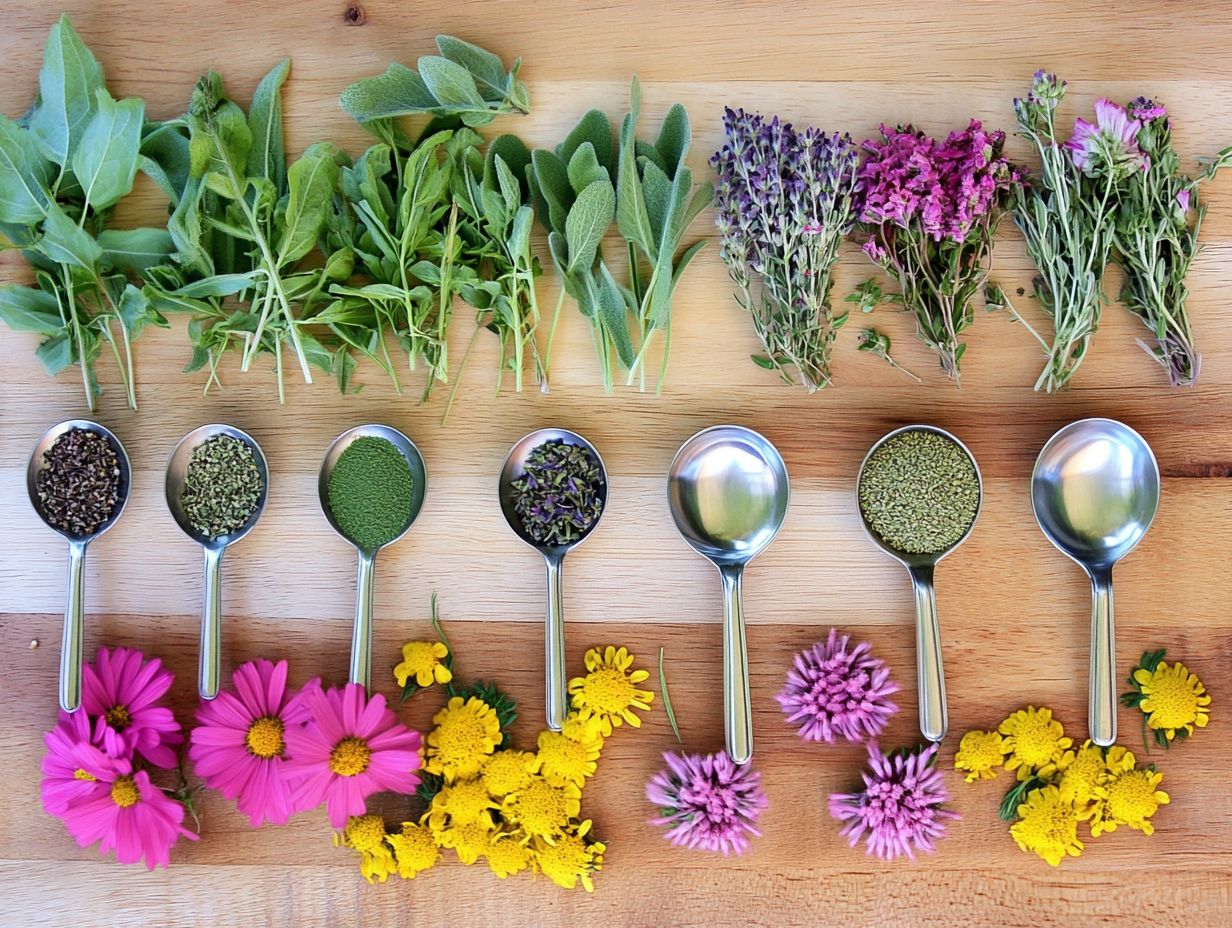
- Always consult with a healthcare provider before administering herbal remedies to adults and children, especially for those with chronic conditions or during surgery preparation.
- Understanding dosage and potential side effects is essential for the safe use of herbal remedies, particularly regarding herbal dosing.
- Follow recommended guidelines when administering herbal remedies to children, considering their age and potential risks associated with herbal medicine safety.
What are Herbal Remedies?
Herbal remedies represent a rich tapestry of natural treatments derived from medicinal herbs and herbal extracts. They have long been embraced across cultures for their health benefits.
These remedies draw upon various parts of the plant leaves, roots, and flowers each known for active ingredients that may help alleviate a range of health conditions, from acute ailments to chronic issues. Caution is advised as some herbal medicines are not regulated.
While many consumers are drawn to herbal products for their perceived advantages, it’s important to understand the context of traditional use and the differing quality standards and claims prevalent in the marketplace.
Throughout history, numerous herbs, including St. John’s Wort, have garnered attention for unique applications. Take chamomile, for instance; it is celebrated for its calming effects and is often found in various dietary supplements aimed at promoting relaxation and aiding sleep.
Then there’s elderberry, renowned for its immune-boosting properties during the cold and flu season, often utilized in herbal therapy. Recognizing the historical significance of these herbs enriches their relevance today.
As herbal enthusiasts explore alternatives to conventional medicine, awareness of potential side effects, quality control, herbal medicine safety, and regulatory issues becomes increasingly important. Becoming aware of these factors gives you the power to make informed and safer choices while looking into the potential benefits of these time-honored, natural treatments.
Safety Considerations for Herbal Remedies
When exploring the realm of herbal remedies and herbal extracts, prioritizing safety is paramount. These natural options can interact with prescription medications and dietary supplements, potentially leading to adverse reactions.
It’s important to know that not all herbal medicines undergo regulation from organizations like the FDA or the NHS. This raises valid concerns about their safety and effectiveness.
By consulting a healthcare provider who understands herbal medicine interactions and health matters, you can significantly reduce the risks associated with herbal consumption. This is particularly crucial if you have chronic conditions or are preparing for surgery.
Understanding Dosage and Side Effects
Understanding the right dosage and potential side effects when using herbal remedies and herbal supplements is essential. Improper dosing can pose poisonous effects and undermine the effectiveness of the herbal treatment.
Each herbal supplement comes with its own dosage recommendations, influenced by factors like your age, health condition, and the specific active ingredients that provide health benefits. To ensure safety, it’s crucial to understand these guidelines, which you can find in Understanding Herbal Dosage: A Complete Guide. This means it’s important to be cautious in your choices and well-informed about the possible issues that might arise from excessive consumption or incorrect usage of herbal medicines.
Take valerian root, for example, a well-known herbal supplement. It’s well-regarded for its calming properties and is often used as a natural remedy. However, it can lead to drowsiness or headaches if taken in excess. The recommended dosage usually falls between 300 to 600 mg of valerian extract. To learn more about safe usage, check the guidelines in herbal supplements: understanding recommended dosages. Always consult a healthcare professional for the best advice tailored to your individual needs.
Kava is known to relieve anxiety but can cause liver toxicity if not dosed properly. A daily intake of around 300 mg is generally advised, especially for individuals with liver disease. To benefit from herbal remedies, prioritize professional guidance and adherence to proper dosage for herbal teas to achieve desired therapeutic effects while avoiding any harmful effects.
Dosage Recommendations for Adults
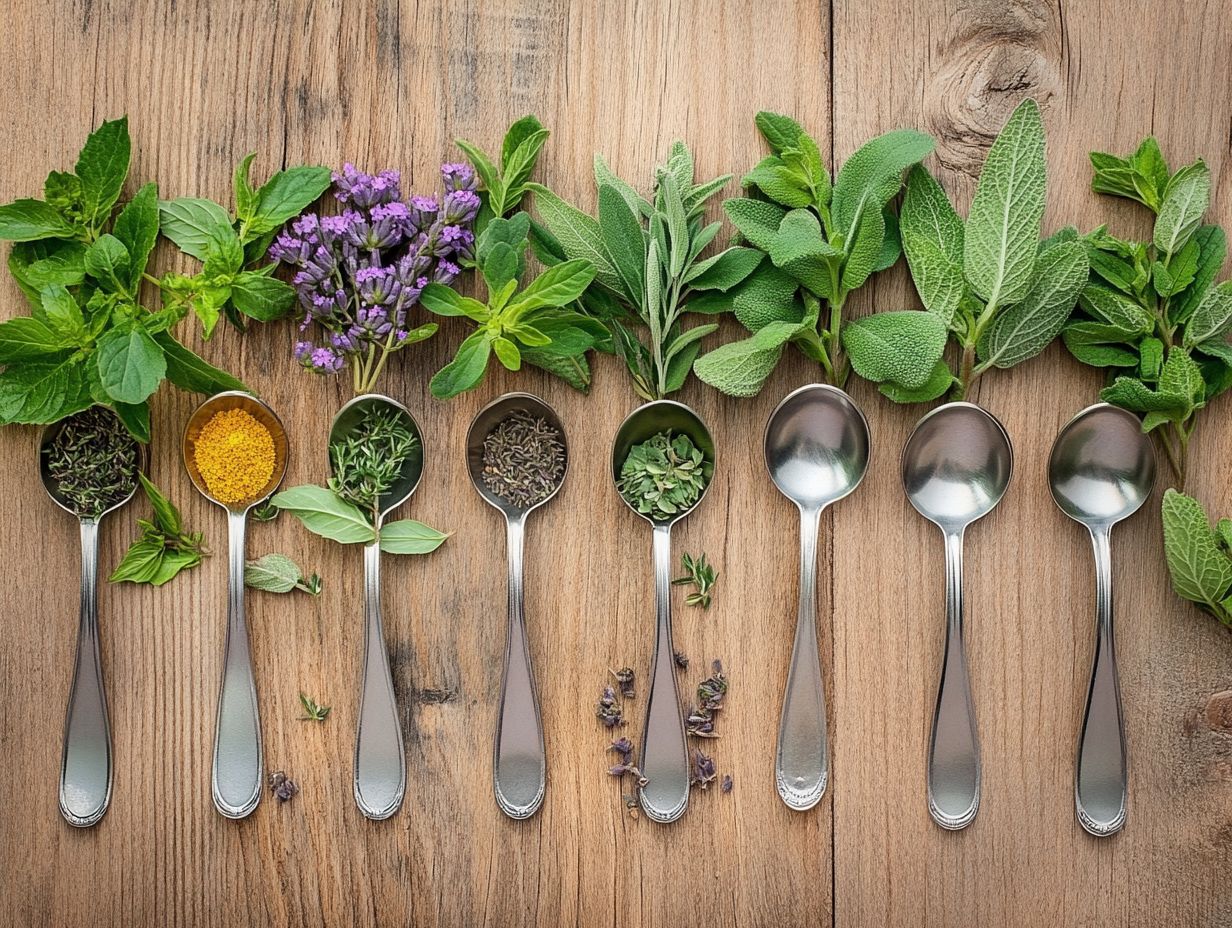
Dosage recommendations for adults using herbal supplements and herbal extracts can vary considerably based on the type of herb, the condition being addressed, and individual health factors. Always consult a healthcare professional before embarking on any herbal therapy to ensure you’re following the appropriate dosage.
Improper dosing can result in ineffective treatment or, worse, harmful effects, especially due to the lack of regulation surrounding certain herbal products. Gaining a solid understanding of the active ingredients and their effects on health, along with knowledge of herbal medicine effectiveness, is vital for safely integrating herbal remedies into your wellness routine. To help avoid pitfalls, be sure to learn about the 5 common herbal dosage mistakes to avoid.
General Guidelines and Specific Dosages for Common Herbs
Establishing general guidelines and specific dosages for common herbs is essential for your safe and effective herbal consumption. Each herb, whether it’s chamomile, elderberry, or kava, possesses unique active ingredients that call for tailored dosage recommendations. This approach helps you maximize the benefits while minimizing potential risks associated with harmful effects.
For example, chamomile is typically recommended at dosages of 200-400 mg per day, owing to its soothing properties derived from active compounds like apigenin. On the other hand, elderberry, rich in potent antioxidants like flavonoids, is often dosed at 300-600 mg for optimal immune support. To ensure accurate herbal dosages, it’s essential to know how to measure herbal dosages accurately, making elderberry a popular choice among herbal products.
It’s crucial to adhere closely to these recommended dosages, as exceeding them may lead to harmful effects and increase the risks of toxicity. Take the time to educate yourself about the efficacy and safety profile of each herb, critically assessing marketing claims to differentiate fact from fiction. This way, you can responsibly harness the full therapeutic potential of these natural remedies, including following herbal dosage guidelines for pregnant women.
Dosage Recommendations for Children
In terms of dosage recommendations for children using herbal remedies, careful consideration is paramount. Children’s developing bodies react differently to herbal products than adults do, making it essential to adhere to age-appropriate dosages and consult with a healthcare provider.
This diligence not only helps avoid potential side effects and harmful effects but also ensures the safety and efficacy of the herbal treatment. By taking a cautious approach rooted in herbal safety guidelines, you can make informed decisions about using herbal remedies for your child, ultimately safeguarding their health and well-being.
Don t wait! Make informed choices today! Your health matters act now to ensure safe herbal use!
Age-appropriate Dosages and Precautions
Using herbal remedies for children can be rewarding, but safety must come first! Common herbs like chamomile, peppermint, and ginger need careful dosage considerations based on age.
Children metabolize herbal extracts differently than adults. Follow safety protocols to avoid adverse reactions and ensure effective treatment.
Always consult a healthcare provider before introducing any herbal remedy. Some herbs can affect how medications work or may not be safe for younger ages.
Herbs like chamomile, peppermint, and ginger have specific dosing guidelines. Consider your child’s weight, age, and overall health for safety and effectiveness.
Staying informed empowers you to make better choices for your child’s health.
Tips for Safely Administering Herbal Remedies to Children
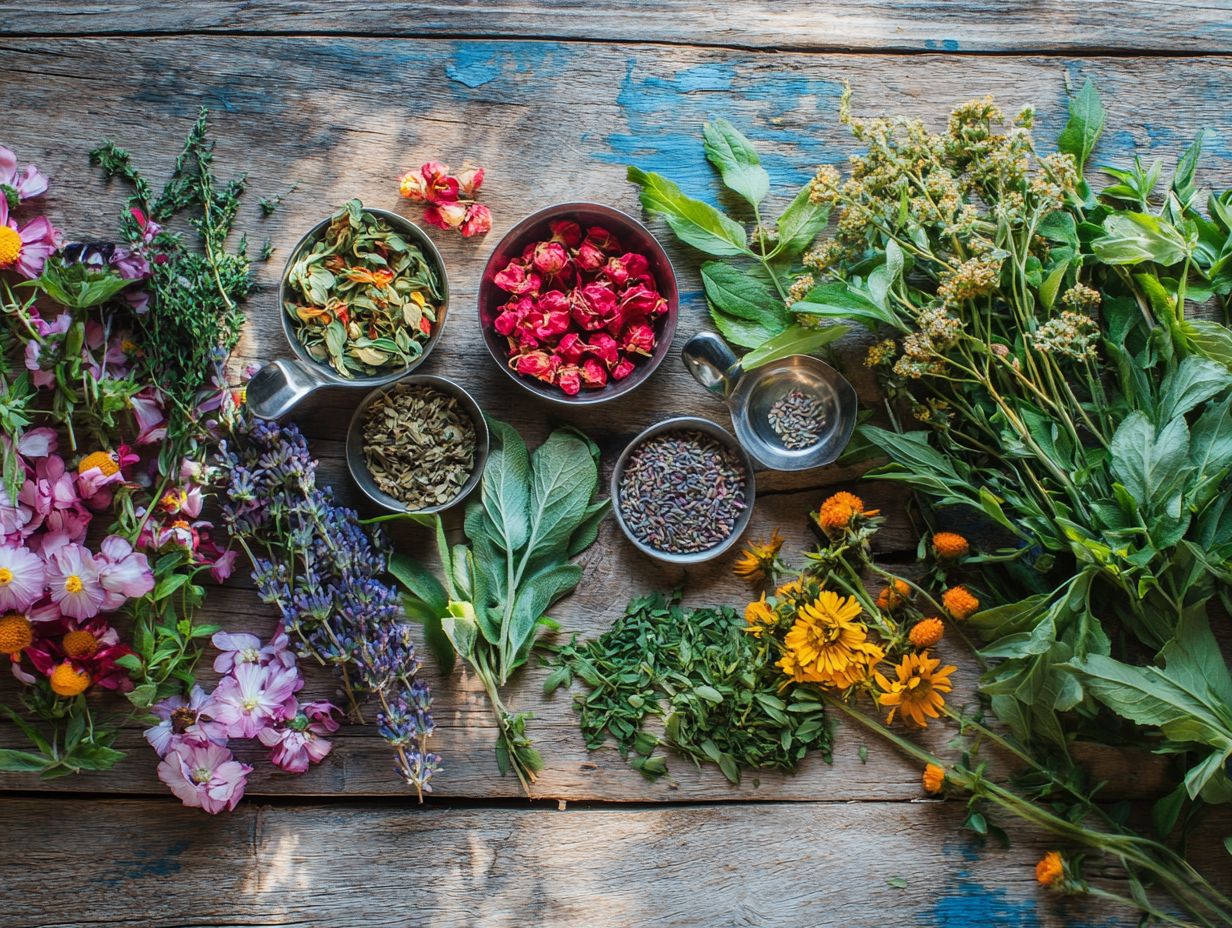
Administering herbal remedies to children requires careful attention to safety guidelines. It’s crucial to implement precautions and follow best practices.
This approach enhances the effectiveness of the remedies and reduces the risk of side effects.
Best Practices and Potential Risks
Following best practices significantly reduces risks and enhances safety for vulnerable populations like children. Be aware of potential side effects to make informed decisions.
Not all herbs are safe for children. While chamomile and peppermint are generally safe, others may cause reactions or interact with medications.
Watch for signs of an allergic reaction, like rashes or digestive upset. Consult healthcare professionals before introducing any herbal remedy for a safer experience.
Frequently Asked Questions
What are herbal remedies and why are they popular?
Herbal remedies are natural substances from plants believed to have medicinal properties. They’ve treated various ailments for centuries and are popular for their effectiveness and minimal side effects compared to traditional medicines.
Is it safe to give herbal remedies to both adults and children?
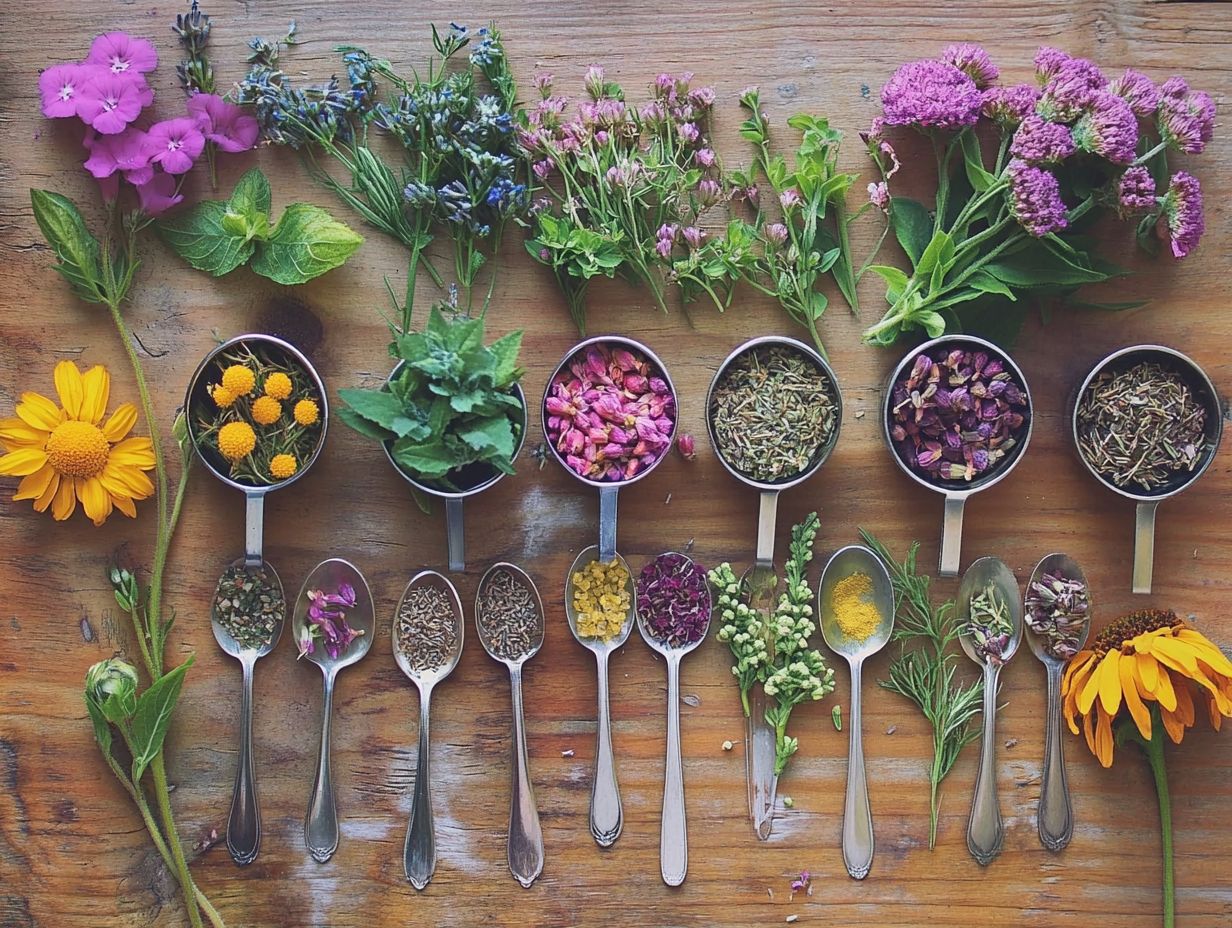
Generally, herbal remedies are safe for adults and children. However, it’s vital to consult a healthcare professional before giving any herbal remedy to a child.
Children may require different dosages than adults, so seek professional advice to ensure safety.
How do I determine the safe dosage of herbal remedies for adults?
The safe dosage of herbal remedies can vary by type, form (like tea or capsules), and individual health. Always talk to your doctor or follow the dosage instructions on the product label.
What about herbal remedies for children? How do I determine the safe dosage for them?
Children usually need a lower dosage than adults. Always consult your doctor and consider starting with a smaller dose, gradually increasing it if necessary.
Are there any potential risks or side effects when taking herbal remedies?
While herbal remedies can be beneficial, they may also pose risks or side effects. Be aware of allergies and interactions with medications. Always buy from trusted sources and stick to recommended dosages.
Can herbal remedies be used alongside traditional medicines?
In some cases, herbal remedies fit well with traditional medicines. However, it s crucial to talk to your doctor first to avoid potential interactions that could reduce the effectiveness of either treatment.

